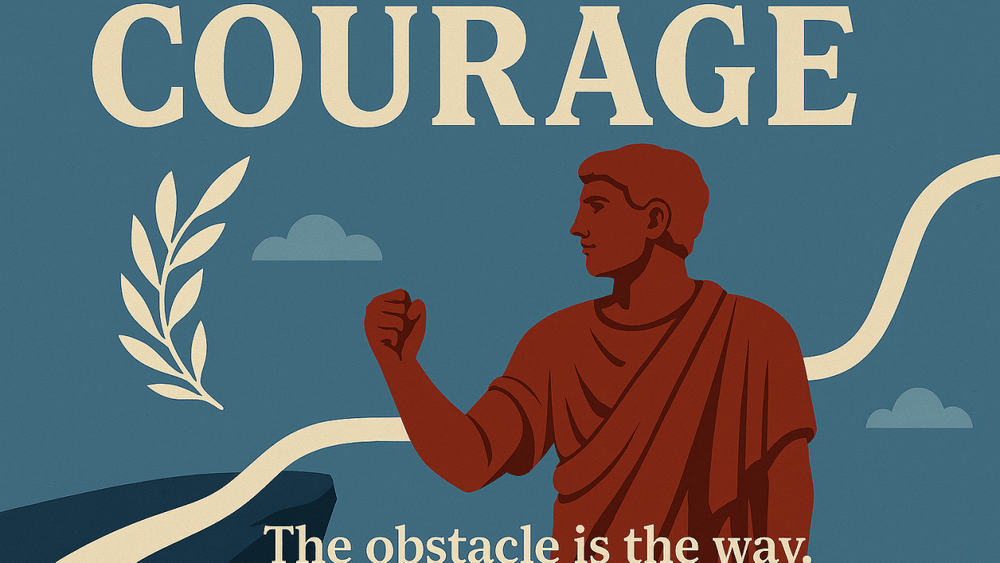Now Is the Time for Courage not Fear
Over the weekend I read a thought-provoking piece in Harvard Business Review: Now Is the Time for Courage. It struck a chord, not just as someone who runs a leadership search firm, but as someone who cares deeply about the cleantech mission and the leaders driving it forward, and as someone who sees value in the philosophy of Stocism, in business and life.
While the article doesn’t specifically mention Stoicism, many of its core principles are, in my view, deeply Stoic in nature. Ideas like acting in accordance with your values, focusing on what’s in your control, making peace with uncertainty, having courage; these aren’t just tools for inner calm, they’re practical strategies for leadership.
And let’s be honest: right now, cleantech leaders are being tested.
Headwinds and Tailwinds
On one hand, the long-term case for the energy and mobility transitions is stronger than ever; record investment, global urgency, unstoppable innovation. On the other hand, political headwinds, funding slowdowns, and policy reversals (hello, U.S.) have made the short term more volatile than it has been in years.
We’re not in crisis. But we are in complexity.
And in complex times, courage is not optional, it’s the differentiator.
What Courage Looks Like in Practice
The HBR article lays out a helpful framework, five concrete actions leaders can take to cultivate boldness and courage, even in uncertain conditions. I share them here, with a few thoughts on how they might apply in the cleantech and climate-tech world.
1. Articulate your ambitions clearly.
“You can’t be bold without something bold to strive for.”
Whether you’re a founder, a fund, or a scaleup CEO, now is the time to sharpen not soften your mission. People need clarity. Not spin, not slogans. Real clarity. What are you building? What are you solving? What’s non-negotiable?
In uncertain conditions, vague goals lead to vague action. Courageous leaders set direction with precision.
2. Embrace discomfort.
“Discomfort is a sign you’re pushing against the status quo.”
Growth is not for the feint-hearted. Hiring in a soft market feels uncomfortable. Opening new markets, launching products, holding firm on your values; none of it is easy.
But comfort is not where change happens. In Stoic thinking, eustress or productive discomfort, is a sign that you’re alive to the challenge. Avoiding it isn’t wisdom, it’s delay.
3. Cultivate discipline.
“Courage isn’t reckless, it’s consistent.”
This is one of the great misunderstandings about bold leadership. Boldness doesn’t mean chaos. It means moving forward with discipline, even in uncertain conditions. In hiring, this might look like being clear on what you need and why, making fast decisions, and not second-guessing once a decision is made.
In cleantech boardrooms, it might mean sticking to long-term goals even when short-term pressures suggest retreat or inertia. Of course don't just burn up your cash runway, maybe being bold is to cut or reallocate costs?
4. Stay close to what matters.
“Bold leaders prioritise direct experience over secondhand opinions.”
Talk to your customers. Visit projects. Meet the candidates yourself. Don’t delegate your understanding of the market or your culture. When you're present, when you're in it, you're less likely to be paralysed by abstract fear, or the fear of others you delegate opinion to.
This is something I’ve always respected about the best VCs and founders I work with: they don’t lead from spreadsheets or press releases. They lead from real conversations and grounded judgment.
5. Connect to your values.
“Fear makes us forget what matters most.”
When everything feels in flux, values become your compass. For me, Stoicism offers a useful framework: focus on what you can control, act with integrity, and don’t outsource your peace of mind to the market cycle.
In our Q2 Market & Talent Review, we talk about how companies with strong internal clarity on mission, values, and team growth and purpose, are the ones that continue to attract top talent, even when others are pausing.
Courage, ultimately, is clarity in action.
A Question of Leadership
The energy and mobility transitions will be led by people. Bold, values-driven, resilient people.
In Q2 we saw several cleantech companies double down on hiring, on expansion, on product. We also saw some hesitate. And the difference between them? Often it wasn’t funding. It was mindset.
So I’d love to hear your thoughts:
- Where are you seeing bold leadership right now?
- Who’s stepping up? Who’s holding back?
- And for those holding back - what’s holding you?
- If you have a particularly bold or cautious leader, how does that make you feel?
This isn’t about reckless risk-taking. It’s about stepping into uncertainty with integrity, direction and courage.
That’s what the best leaders are doing. And that’s what the cleantech sector needs right now.
Final Thought
Courage isn't loud. It isn’t always obvious. But in times like these, it’s the quiet boldness, the let’s keep going, let’s build anyway, let’s make the hire, that will shape and lead the sector.
One of my favourite Stoic concepts is the obstacle becomes the way. You can either pause, or navel gaze, or you can use the obstacle and reevaluate the landscape. Sometimes it is better to hold back, but history in business shows that fortune favours the brave. The art of leadership is knowing what to do in these times of complexity.
I believe at the present moment, the bold won’t just survive this, they’ll define what comes next.
Happy to hear your thoughts as above, or in general, publicly or privately.
David Hunt



